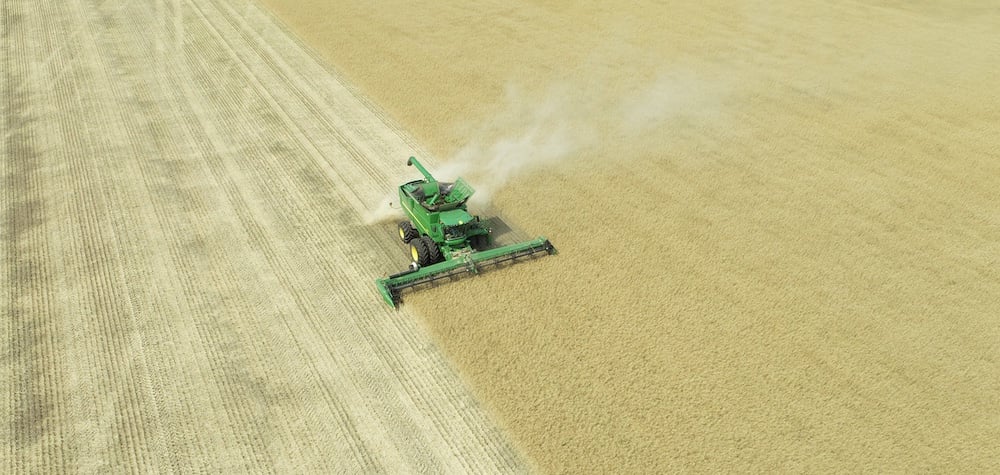The seven per cent solution
This spring, Brady Ferris, owner of Blanket Farms in Maymont, Saskatchewan, gets to try something many farmers won’t see until this fall.
“It’s supposed to be a five percent bump over DK400TL,” he says about DK401TL, the newest DEKALB® TruFlex® LibertyLink® canola hybrid.
“I’m excited to see how it does.”
Tim Darragh, Market Development Manager – Canola Trait Systems at Bayer, says that on average, trials show the new DK401TL yielding 107.8 per cent above InVigor® L340PC® which is currently the most widely grown hybrid canola.
“I’ve helped develop and test DEKALB for over a decade and I’ve never seen anything like DK401TL,” Darragh says. “It’s a result of our precision breeding platform and a testament to what the brand’s new lineup will deliver to Canadian farmers.”
Tim Gardner, Bayer Agronomy Manager based in Saskatoon, explains that DK401TL also comes with all the advantages of the TruFlex® LibertyLink® trait. That is, with TruFlex® LibertyLink® , growers can use either Roundup Ready® or LibertyLink® technologies or a combination of both for customized weed control in each individual field. Having both herbicide systems available allows growers to control the broadest spectrum of weed species with a wider window of application together with increased rate flexibility.
Ferris has been growing TruFlex® LibertyLink® canola for several years on his farm, where he and his family mostly produce canola, small grains, peas and wheat.
“I really like the dual herbicide trait as it’s very flexible,” he says. “Now that I’ve grown it several times, I would never go back to using any other system.”
Volunteer canola management made simple
Darragh explains growers often worry that canola volunteers after TruFlex® LibertyLink® will be hard to manage, but this has been shown not to be the case.
“There are numerous pre-seed tank mix partners that you can choose to apply with Roundup® that will control all volunteers (including TruFlex® LibertyLink®) prior to cereals, pulses and canola,” he says. “And an added benefit to using a second mode of action in your pre-burn is that you’re minimizing herbicide resistance in other weeds. Likewise, there are plenty of fantastic options in-crop for cereals and pulses that provide exceptional control of volunteers regardless of trait.”
Take down kochia, wild oats … and 49 other problematic weeds
With herbicide-resistant weeds a yearly headache, the flexibility to choose either Liberty® or Roundup, alone or in sequence, allows growers the most options possible.
“You can hit Group 9-resistant kochia early with Liberty® and still have the option to come in with Roundup as an excellent second pass option for Group 1-resistant wild oats and volunteer cereals,” Darragh says. “Having that second pass with a different mode of action to take care of wild oats is huge. And Roundup is a good option when conditions are dull and cool and not conducive for Liberty®. Roundup is also a way better option for control of lamb’s quarters in drier areas.”
Ferris agrees. “You can smack those resistant kochia with Liberty® in the first pass, and then later in the season, you can hit the wild oats if you need to with Roundup,” he says. “It’s really nice to have the options if you’re having to deal with both, like a lot of us are.”
Come for the yield, stay for the flexible weed control
Ferris adds that he’s been asked quite a few times about yield. That is, some growers think that with the dual trait, TruFlex canola hybrids won’t perform as well as those with only one herbicide trait system.
“People say, there must be some sort of hit, some sort of impact,” he says, “but I haven’t seen that.”
Gardner says farmers like Ferris are now benefiting from the unprecedented high-yielding genetics plus the new sought-after standard features offered by TruFlex® LibertyLink® canola, adding the brand has improved significantly in the last three years.
“We have Straight Cut Plus traits for enhanced pod shatter protection, as well as clubroot resistance across the entire lineup,” he says. “DEKALB is also known for its earlier maturity, allowing farmers to get into the field sooner and out quicker, with a smoother harvest. This can be critical when harvest weather cuts timelines short.”
Darragh urges farmers not to miss the chance to see DK401TL in action first-hand this summer by contacting their local Bayer representative to attend a tour in their region. Information is also available at Dekalbcanola.ca.
“It’s the hybrid you really should see this year of all the hybrids in various trials,” he says.
Brady Farris is growing DK401TL in 2024 for Bayer trial data purposes and was provided with 1 bag (10 ac.) from Bayer for this demonstration.










